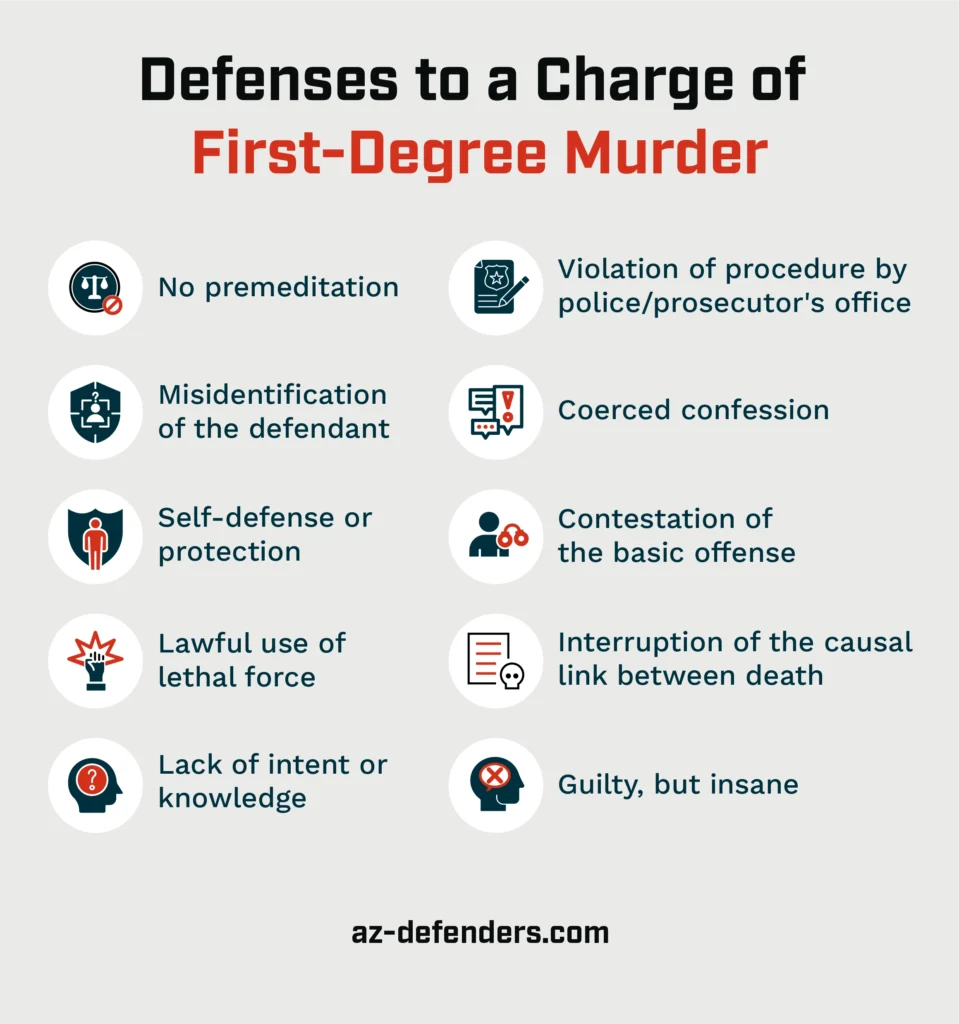
Posted on September 18, 2025 in Assault & Violent Crimes
The most serious crime you can be charged with in Arizona is first-degree murder as described by Arizona Revised Statute (ARS) 13-1105. No other crime in Arizona carries the possibility of a Class 1 felony sentence of death upon conviction.
There are three kinds of first-degree murder: premeditated murder, felony murder, and murder of a law enforcement officer.
In this post, we examine the three types of first-degree murder, how a court decides whether to impose the death penalty or life imprisonment for a first-degree murder conviction, and the possible defenses that exist to a first-degree murder charge.
If you are facing a charge of first-degree murder in Arizona, then you need to take decisive action to save your life or to avoid spending the rest of it in an Arizona state prison. Call AZ Defenders at (480) 456-6400 to speak with an experienced criminal defense attorney immediately.
The law that governs first-degree murder in Arizona is ARS 13-1105. This statute establishes three types of first-degree murder, each with its own elements that the prosecution must prove.
Premeditated murder is the kind of first-degree murder that most people are familiar with. The main elements of premeditated murder are:
Sometimes an act of homicide does not take place by itself. It can happen during the commission of another crime. In some specific circumstances, if someone dies during the commission of a felony-level offense, then this qualifies as first-degree murder under what is known as the felony murder rule.
ARS 13-1105(A)(2) lists the following crimes that can underlie a felony murder charge:
If a death occurs during the commission or furtherance of any of these crimes, or while you are in immediate flight from its commission, then you can be charged with first-degree murder.
It is not necessary for the death to be an intentional killing. It can be accidental or inadvertent. There simply needs to be a causal connection between the felony act and the death. The only intent the prosecution needs to prove is the intent to commit the underlying felony.
You can be charged with felony murder if you are acting alone, or with others. If you are acting with others, then everyone involved in committing the underlying felony can be charged with felony murder, not just the person who committed the fatal act.
If you are acting with others to commit a felony, and one of your fellow actors dies in connection with the felony, then you can be charged with felony murder even if no one else dies.
So, for example, if you and another person commit a burglary, and while fleeing from the scene of the crime, you get into a car accident in which your accomplice dies, then you can be charged with felony murder even if no one else is hurt or dies in the accident.
The third kind of first-degree murder specifically relates to causing the death of a police officer in the performance of that person’s official duties.
This charge requires proof that:
Depending on the type of first-degree murder you are charged with and other circumstances, you can face one of three possible penalties if a court convicts you:
For first-degree murder charges based on a killing that took place on or after August 2, 2012:
Unlike most other crimes, no statute of limitations exists for a charge of murder. This is why the distinction for murders committed before August 2, 2012, remains relevant.
Under Arizona law, if the state seeks the death penalty, then it needs to file a notice of intent to do so. If it does, then a threshold question is whether a defendant convicted of first-degree murder is at least 18 years old.
| Type of First-Degree Murder | Defendant Under 18 | Defendant 18 or Older |
| Premeditated murder or Murder of a law enforcement officer | Imprisonment for life or natural life. | Death or imprisonment for natural life. The trier of fact shall determine unanimously whether death is the appropriate sentence. If the trier of fact determines that a sentence of death is not appropriate, or if the state has not filed a notice of intent to seek the death penalty, then the court shall impose a sentence of natural life. |
| Felony Murder | Imprisonment for life or natural life. | Death or imprisonment for life or natural life. |

If the prosecution seeks the death penalty, then the decision whether to impose it upon conviction depends on the “trier of fact” weighing proven aggravating and mitigating factors.
In determining whether to impose a sentence of death or life imprisonment, the trier of fact shall take into account the aggravating and mitigating circumstances that have been proven.
If the trier of fact is a jury, and the jury cannot reach a unanimous verdict on any of the alleged aggravating circumstances and has not found that at least one of those circumstances has been proven, then the court must dismiss the jury and impanel a new jury.
If the prosecution proves that at least one aggravating factor existed in the killing, and no mitigating factors sufficient to call for leniency were present, then the trier of fact must impose a sentence of death.
The prosecution must prove the existence of the aggravating circumstances beyond a reasonable doubt, and the jury must make a unanimous finding that the aggravator has been proven.
Aggravating factors in a first-degree murder conviction include:
Convictions for serious offenses committed on the same occasion as the homicide, or not committed on the same occasion but consolidated for trial with the homicide, are treated as a serious offense for purposes of establishing aggravating circumstances.
As you can see, the felonies that can lead to a felony murder conviction, plus a few others, are aggravating circumstances.
The burden of establishing the existence of mitigating circumstances is on the defendant. The defendant must prove the existence of mitigating circumstances by a preponderance of the evidence.
If the trier of fact is a jury, then the jurors do not have to agree unanimously that a mitigating circumstance has been proven to exist.
Possible mitigating factors include, but are not limited to:
Because of the grave nature of the charge, it is important to explore every possible available defense to a charge of first-degree murder. The prosecution must prove all the elements of its murder case against you beyond a reasonable doubt.
So, any defense that casts reasonable doubt on any element of the charge of first-degree murder can possibly lead to either an acquittal of first-degree murder or at least a reduction to a lesser charge.
Depending on the facts of your case, one or more of several defenses may exist. Below are some of the more common defenses to a first-degree murder charge in Arizona.
If you have been charged with first-degree murder in Arizona, the best outcome you can hope for if you are found guilty is a life sentence with the possibility of release in maybe 25 years. In the worst case, you can end up on death row in a state prison.
You cannot afford to take chances or cut corners in your legal defense to a first-degree murder prosecution. Your life may depend on it.
Therefore, if you have been charged with first-degree murder in Arizona, then you need the best possible legal representation from an experienced criminal defense lawyer. That is what you will have when you retain AZ Defenders to represent you in pretrial negotiation and at trial.
Our board-certified Arizona criminal defense attorneys have more than 200 years of combined legal experience, and we have three board certified criminal defense specialists on our team. We have successfully represented thousands of clients in Arizona, including clients charged with violent crimes like first-degree murder.
Many of our attorneys are former state, county, and city prosecutors. who have successfully represented hundreds of people in homicide cases. We know how prosecutors work in murder cases and are highly experienced in presenting the strongest possible defense to secure the best possible outcomes for our clients.
Call us at (480) 456-6400 at any time to speak with one of our law firm’s criminal defense specialists and to schedule a free initial consultation. You can also arrange a free consultation with us by using our online contact form.